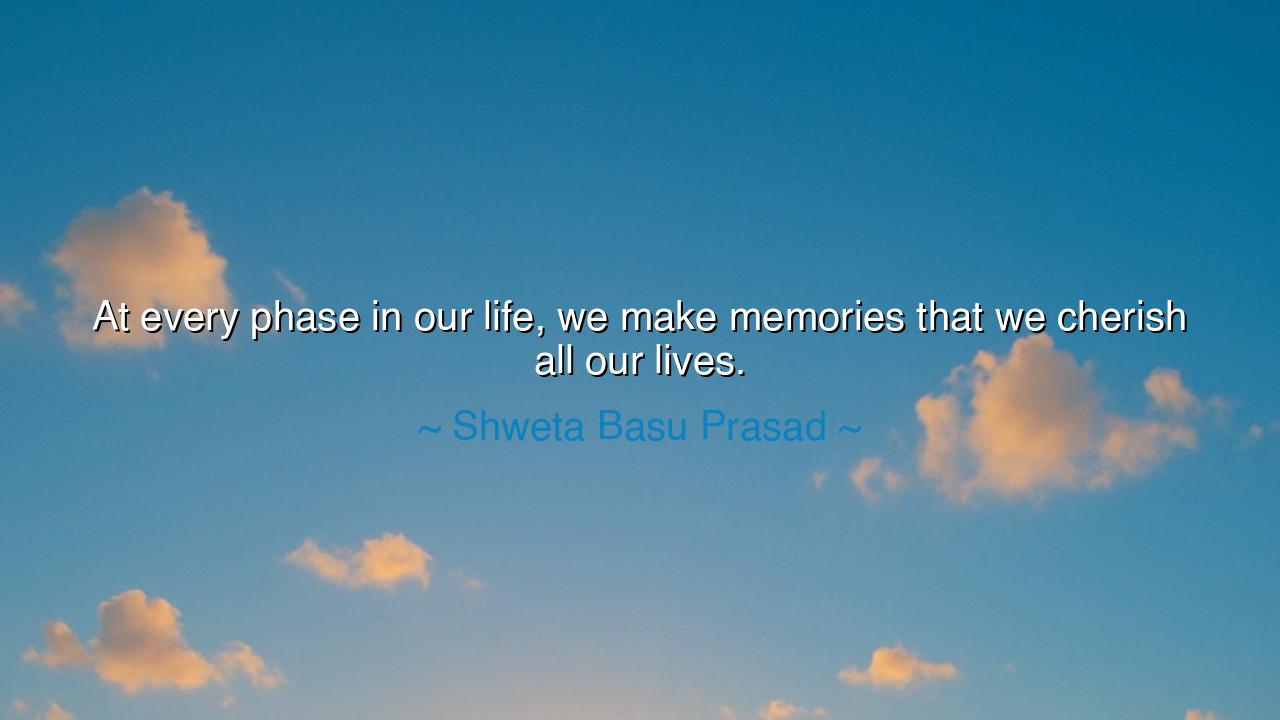
At every phase in our life, we make memories that we cherish all






"At every phase in our life, we make memories that we cherish all our lives." These words from Shweta Basu Prasad speak to the profound power and importance of memories in shaping the human experience. They are a reminder that our lives are woven together not just by the events that occur, but by the way we remember and reflect upon them. Memories are the stories we tell ourselves about our past, and they shape not only who we are but who we aspire to become. At every stage of life—whether in childhood, adolescence, or adulthood—we accumulate experiences that, though fleeting in the moment, become enduring treasures that provide comfort, guidance, and meaning.
In the ancient world, the concept of memory was often intertwined with identity and storytelling. The Greeks believed that to forget one’s past was to lose a part of the self. Homer’s epics, such as the Iliad and the Odyssey, were filled with memories of heroic deeds, family legacies, and wars, passed down orally through generations. These stories were not just about recounting events; they were about preserving the cultural identity of the Greek people and offering future generations a vision of the ideals they should strive for—honor, bravery, and wisdom. Similarly, in the Hindu tradition, the Mahabharata and Ramayana served as repositories of cultural wisdom, their stories teaching important moral lessons through the memories of past actions, both divine and human.
Consider the life of Marcus Aurelius, the Roman emperor and philosopher, who left behind a remarkable set of personal writings known as the Meditations. These writings are a collection of his memories, reflections, and lessons learned throughout his life. Marcus Aurelius was deeply concerned with the idea of impermanence and legacy, understanding that the memories he left behind would be a testament to his character and virtue. His reflections on the fleeting nature of life, the importance of self-discipline, and the pursuit of virtue are not just personal musings—they are a legacy that continues to inspire generations, offering us a model of how to live a meaningful life. For Marcus, his memories were both a source of strength and a moral guide, helping him to stay grounded and focused even during times of war and political turmoil.
In modern times, we see how memories continue to shape the way we understand ourselves. The life of Anne Frank, whose diary became a symbol of the resilience of the human spirit, illustrates how memories—even those written down in the darkest of times—can shape the collective consciousness of generations. Her words, preserved in her diary, offer a glimpse into the life of a young girl during the horrors of World War II, and though her life was tragically cut short, the memories she left behind continue to inspire us to stand against oppression and injustice. The importance of preserving these memories, and sharing them, cannot be overstated, for they are the very foundation of our humanity, teaching us the value of compassion, empathy, and resilience.
The lesson in Prasad’s quote is simple but profound: every moment in life—no matter how small—has the potential to become a cherished memory. It is not the grand events alone that define our lives, but the accumulation of all the little moments of joy, sorrow, laughter, learning, and connection. Every conversation, every encounter, every challenge is a thread in the fabric of our lives, and it is through these memories that we form a sense of self. We should not wait for the “big moments” to give meaning to our lives. Rather, we must recognize that the moments we experience daily are meaningful in themselves, and the memories we create will define who we are and how we navigate the future.
In our own lives, we must strive to live fully in every phase of our journey, recognizing that each moment contributes to the story of our lives. Let us not rush through life, always looking ahead, but instead take time to appreciate the present. Whether it is the simple joy of spending time with loved ones, the challenges we face in our work, or the quiet moments of reflection, each of these moments is a memory in the making. We must not only live but reflect on our lives with an eye toward the memories we are creating and how they will shape us. In doing so, we honor the sacredness of each moment, knowing that these memories will serve as our guides and comforts in times of need.
Ultimately, let us remember that it is not the size of our experiences, but the depth of our engagement with them, that shapes the memories we carry. Just as Homer’s epic tales continue to teach us about the virtues of the ancient world, so too can the memories we create in our own lives continue to inspire future generations. Memories are the treasure we hold, and like a painting, they are shaped by every stroke of time, forming a masterpiece that tells the story of our lives. Let us live with intention, knowing that the moments we create today will become the cherished memories of tomorrow.






AAdministratorAdministrator
Welcome, honored guests. Please leave a comment, we will respond soon